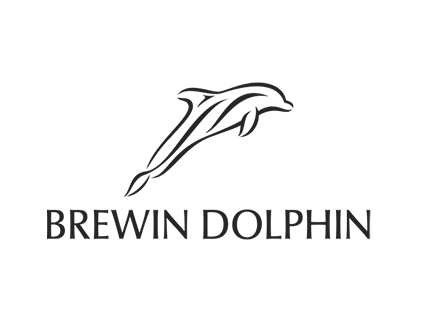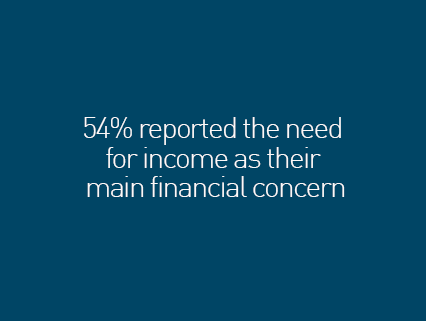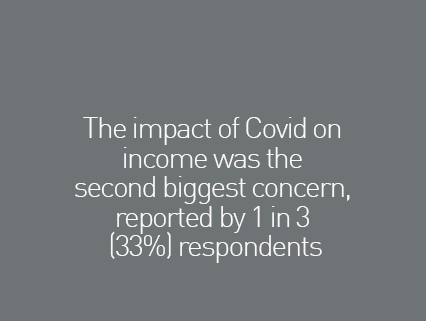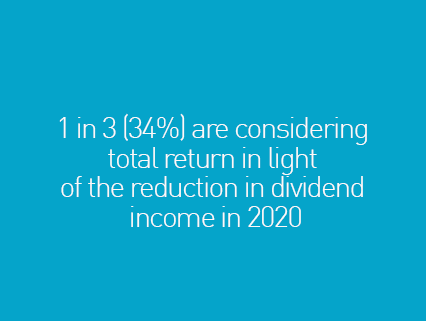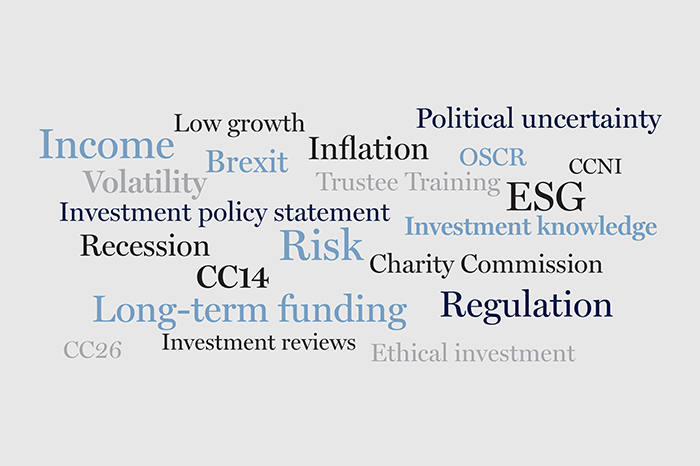
Charity Investment: Taking Stock
Brewin Dolphin
New research for Brewin Dolphin, Charity Investment: Taking Stock, follows our 2019 and 2017 reports, which each examine the investment and other financial challenges facing UK charities.
This biennial research programme plays a significant part in the Charity Team’s business development strategy, providing content for their nationwide series of trustee training seminars, other client engagement activity, marketing and PR campaigns.
Since the research in 2019, charities have played a critical role in supporting communities through the Covid-19 pandemic, including working with the NHS to help deliver the vaccination programme. In providing these and other essential services that government and councils have increasingly become dependent upon, the sector has underlined its importance to many aspects of society.
The majority of the grant-making and service-providing charities that took part in the research had experienced an increase in demand, which they expected to continue. This, together with the challenges of managing the effects of the pandemic, placed unprecedented pressures on how they manage their financial budgets and reserves. Despite the stock market recovery to approaching pre-pandemic levels, charities were concerned about ongoing economic uncertainty and the attendant investment risk to the value of their portfolios.
As discretionary investment managers, Brewin Dolphin’s mission is to support clients in meeting these challenges and to mitigate the weight of investment responsibility. Their 360-degree perspective on every aspect of a charity’s financial position – reserves, investments and future goals – helps ensure that they provide the right support to accommodate changing needs for income or capital in harmony with the operating environment.
The research highlighted the importance of a close working relationship between trustees, investment managers, auditors and other specialists, to both optimise opportunity and minimise risk.
Navigating Uncertain Times
The pressure to sustain services and grant giving “at a time when the ability to generate income is tougher” was a key finding from the 2019 study. Charities reported that they were “picking up the slack after a decade of austerity” and felt the pressure of “delivering contracts that always want more for less”, providing “really crucial” services in a challenging and uncertain economic environment. Half of charities were not confident their funding levels would enable them to meet their charitable objectives in 2020. The number of charities fearing a global recession more than doubled to 26% against 11% in 2017. Both reports included expert comment from Brewin’s Charity team specialists in England, Scotland and Wales and third party industry experts, including the Charity Finance Group.
Commenting on the findings, Ruth Murphy, then Head of Charities at Brewin Dolphin said:
“Charities are being asked to take on more every year and cracks are beginning to show, particularly for small and medium-sized charities. That half of the charities surveyed do not believe current funding levels and fundraising activity will allow them to meet their charitable objectives over the next year is worrying. Grant-making charities can always cut their cloth accordingly by reducing the grants they make, but service-providing charities do not have that flexibility.”
In addition, the research found that:
- 40% of charities now hold ‘alternative’ investments
- Over three quarters (77%) of charities with investment policy statement specify ethical criteria, up from 60% in 2017
- 58% of charities negatively screen their investments – just 13% use positive screening
- Half (48%) of charities agree that they would benefit from trustees with more varied skill sets
- 43% of charities believe that current regulatory requirements are too demanding
“In October 2017 we found charities dealing with the uncertain political and economic environment at a time of reduced public spending, the replacement of public sector grants with contracts and increased regulatory requirements, placing pressure on operational and financial resources. Sadly, this year’s research shows that these conditions have not improved. Respondents continue to be concerned about funding levels, market uncertainty, low interest rates and rising costs, and face the challenge of doing more, with less”, said Ruth Murphy.
The research identifies the value of regular reviews and underlines the importance of staying focused on the long term, outlining five essential steps on how best to navigate the uncertain times ahead.
More about the research at www.brewin.co.uk
IN THE PRESS 2019
UK Fundraising: Half of charities fear funding levels will be inadequate for meeting 2020 objectives
Third Sector: Survey finds charities fearful of funding their objectives
Third Force News: charities lack funds to meet demand
Civil Society: Charities need for income has never been greater or under such pressure
Charity Finance Group: Brewin Investment Insight
Scottish Financial News: Charities are not confident that funding levels will allow them to meet objectives
IN THE PRESS 2017
Charity Times
Large number of charities don't have ethical investment policy, survey reveals
UK Fundraising
Financial concerns see charities rethinking investments, report shows
Civil Society
A third of charities don't have an ethical investment policy, finds survey
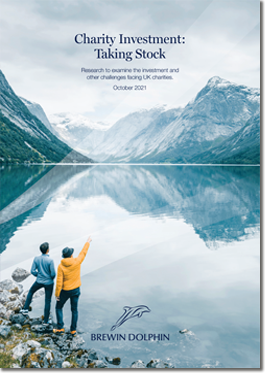
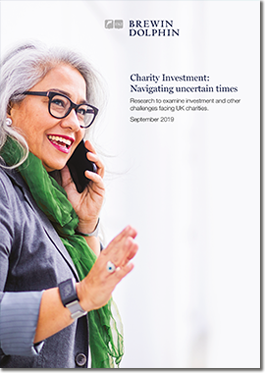
“It’s heartening to see an increase in the inclusion of ethical investment criteria... Now more than ever, it is imperative that Trustees keep front of mind the need for robust investment policies to reflect the values and investment intentions of their charities.”
Roberta Fusco
Head of Policy and Engagement
Charity Finance Group
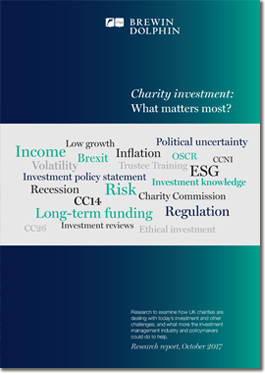
“This is a timely and lucid review of the intensity of the many financial challenges, uncertainties and other pressures facing trustees of UK charities.”
David Carrington
Adviser and consultant on social impact investing and philanthropy

